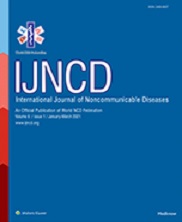Background: Lifestyle changes are affecting the health risk profile of women in developing countries. This study assesses risk factors for noncommunicable diseases (NCDs) and access to NCD screening services among women in Indore city, India.
Materials and Methods: A NCD risk factor survey was undertaken in Indore city through the USAID-funded Building Healthy Cities project. The survey used the World Health Organization STEPwise methodology and tools. A total of 1987 women and 1083 men aged 18–69 years were randomly selected from 90 settlements across 30 wards of the city. Weighted analysis based on sampling strategy and response rate was conducted.
Results: A total of 22% of women (95% confidence interval [CI]: 21, 24) had raised blood pressure and 13% (95% CI: 11, 14) had raised fasting blood sugar or had already been diagnosed with hypertension or diabetes. While only 6% of women were current tobacco users and <1% consumed alcohol in the last 30 days, 60% of women were overweight or obese. Central obesity was observed in 70% of women; 89% of women were not consuming adequate fruits and vegetables, and 20% were physically inactive. Only 41% and 20% of women had their blood pressure and blood sugar measured, respectively, in the last 12 months; <1% were screened for oral and cervical cancers.
Conclusion: Women living in Indore have higher levels of metabolic risk factors, and current NCD screening programs have poor uptake. Gender-sensitive solutions targeting awareness, access, and community environment need further exploration.
Authors: Damodar Bachani, Amanda Pomeroy Stevens, Krishnan Anand, Ritvik Amarchand


